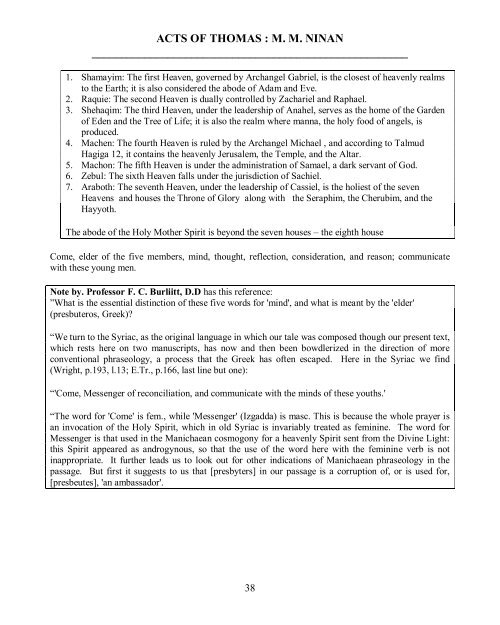You also want an ePaper? Increase the reach of your titles
YUMPU automatically turns print PDFs into web optimized ePapers that Google loves.
ACTS OF THOMAS : M. M. NINAN<br />
______________________________________________________<br />
1. Shamayim: The first Heaven, governed by Archangel Gabriel, is the closest of heavenly realms<br />
to the Earth; it is also considered the abode of Adam and Eve.<br />
2. Raquie: The second Heaven is dually controlled by Zachariel and Raphael.<br />
3. Shehaqim: The third Heaven, under the leadership of Anahel, serves as the home of the Garden<br />
of Eden and the Tree of Life; it is also the realm where manna, the holy food of angels, is<br />
produced.<br />
4. Machen: The fourth Heaven is ruled by the Archangel Michael , and according to Talmud<br />
Hagiga 12, it contains the heavenly Jerusalem, the Temple, and the Altar.<br />
5. Machon: The fifth Heaven is under the administration of Samael, a dark servant of God.<br />
6. Zebul: The sixth Heaven falls under the jurisdiction of Sachiel.<br />
7. Araboth: The seventh Heaven, under the leadership of Cassiel, is the holiest of the seven<br />
Heavens and houses the Throne of Glory along with the Seraphim, the Cherubim, and the<br />
Hayyoth.<br />
The abode of the Holy Mother Spirit is beyond the seven houses – the eighth house<br />
Come, elder of the five members, mind, thought, reflection, consideration, and reason; communicate<br />
with these young men.<br />
Note by. Professor F. C. Burliitt, D.D has this reference:<br />
”What is the essential distinction of these five words for 'mind', and what is meant by the 'elder'<br />
(presbuteros, Greek)?<br />
“We turn to the Syriac, as the original language in which our tale was composed though our present text,<br />
which rests here on two manuscripts, has now and then been bowdlerized in the direction of more<br />
conventional phraseology, a process that the Greek has often escaped. Here in the Syriac we find<br />
(Wright, p.193, l.13; E.Tr., p.166, last line but one):<br />
“'Come, Messenger of reconciliation, and communicate with the minds of these youths.'<br />
“The word for 'Come' is fem., while 'Messenger' (Izgadda) is masc. This is because the whole prayer is<br />
an invocation of the Holy Spirit, which in old Syriac is invariably treated as feminine. The word for<br />
Messenger is that used in the Manichaean cosmogony for a heavenly Spirit sent from the Divine Light:<br />
this Spirit appeared as androgynous, so that the use of the word here with the feminine verb is not<br />
inappropriate. It further leads us to look out for other indications of Manichaean phraseology in the<br />
passage. But first it suggests to us that [presbyters] in our passage is a corruption of, or is used for,<br />
[presbeutes], 'an ambassador'.<br />
38


















